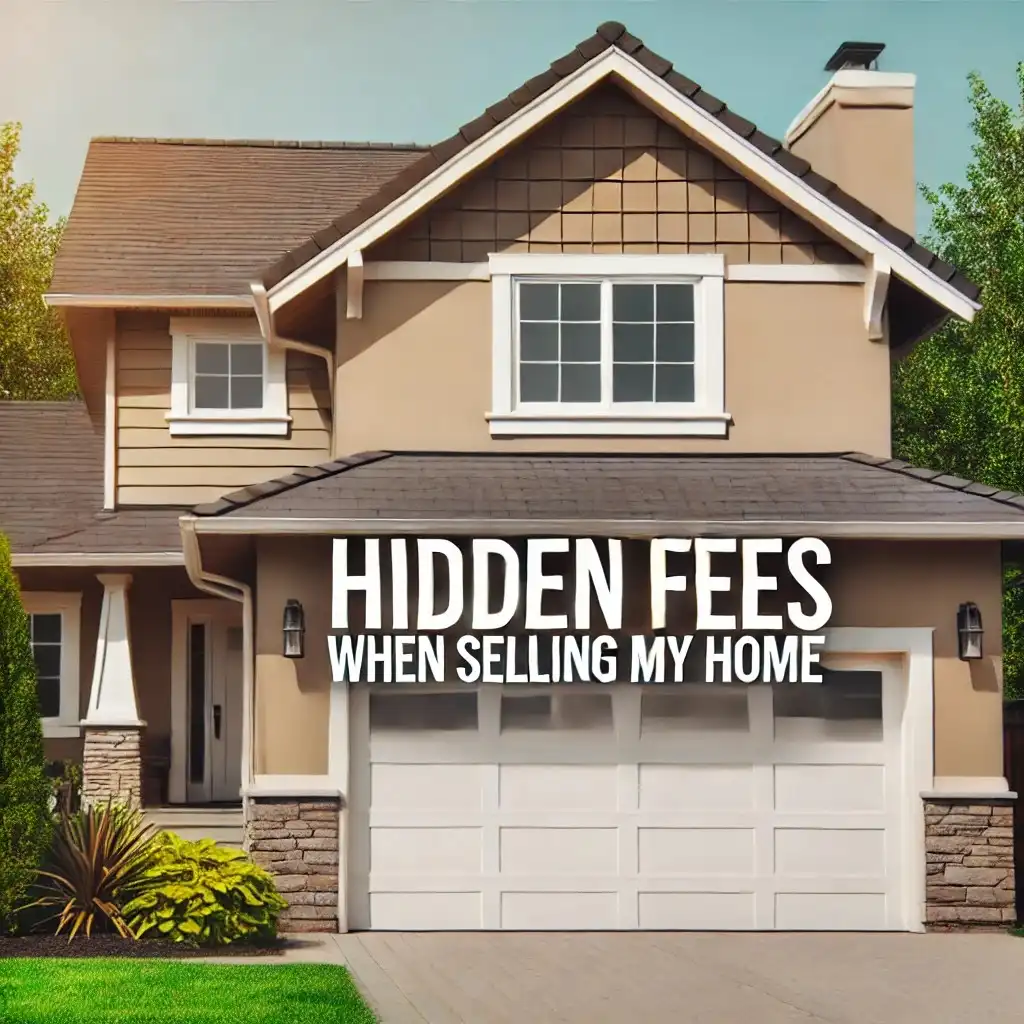Are There Any Hidden Fees When Selling My Home?

Selling a home might appear to be a straightforward process, but once you begin the journey, you’ll quickly realize there are many expenses involved that can catch you off guard. These are often referred to as “hidden fees,” not because they’re purposefully concealed, but because they’re not always discussed openly or planned for in advance. While the main objective in selling a home is usually to walk away with a profit, these additional costs can shrink your proceeds if you’re not fully prepared. Some of the common hidden expenses include closing costs, agent commissions, repair expenses, staging and cleaning costs, property taxes, utility bills, and legal fees. Furthermore, if there are issues discovered during the inspection process, you may be required to handle repairs or negotiate financial concessions. Another key point many sellers overlook is the overlap of ongoing costs—such as mortgage payments, homeowners association dues, and property maintenance—especially if the house stays on the market longer than expected. These outflows can quietly chip away at your bottom line. Understanding these fees upfront is essential to planning effectively and avoiding any unpleasant surprises. Transparency, research, and the right guidance can help ensure that the selling process doesn’t leave you financially stretched.
What Are the Typical Costs Involved in Selling a House?
Selling a house involves more than just finding a buyer and handing over the keys. While the sale price is important, it’s equally vital to understand the costs you will encounter throughout the process. Real estate agent commissions are often the largest expense, generally ranging from five to six percent of the final sale price. This fee is split between the listing agent and the buyer’s agent and is usually deducted from your sale proceeds at closing. Additionally, closing costs for the seller typically include title insurance, escrow fees, and transfer taxes, which together may total between one to three percent of the home’s sale price. Repairs and improvements are another significant cost, especially if you’re aiming to attract higher offers. Even basic touch-ups, painting, landscaping, and cleaning can add up. Some sellers also invest in staging the home to make it more appealing, which involves renting furniture and hiring professionals. There are also holding costs to consider, including property taxes, homeowner’s insurance, mortgage payments, and utilities, which continue until the home officially sells. Finally, legal or administrative fees may arise, especially in transactions that require an attorney or additional documentation. Understanding the full range of these typical costs is key to setting realistic expectations and accurately calculating how much money you’ll actually walk away with once the deal is closed.
Do Home Sellers Have to Pay Closing Costs?
Yes, home sellers are generally responsible for covering a portion of the closing costs, and these can amount to a sizable percentage of the sale price. While buyers also have their own set of closing costs, the seller’s share typically includes title insurance for the buyer, escrow or settlement fees, document preparation charges, notary fees, and any local or state transfer taxes. In some cases, especially in communities governed by a homeowners association, there may be HOA transfer fees that the seller must pay. These charges are essential for finalizing the sale and transferring legal ownership of the property to the buyer. Depending on the region and specifics of the deal, closing costs for sellers usually range from one to three percent of the home’s selling price. Though not often labeled as hidden fees, they can come as a surprise to those who haven’t sold a home before. Sellers sometimes agree to pay a portion of the buyer’s closing costs as a negotiation strategy to close the deal faster, especially in a buyer’s market. It’s important to factor these costs into your financial planning early in the process. Understanding your obligations and reviewing an estimated settlement statement can help you avoid surprises and ensure you know exactly what to expect when it’s time to finalize the sale.
How Much Are Real Estate Agent Commissions?
Real estate agent commissions are among the most significant expenses when selling a home. Typically, the commission rate ranges from five to six percent of the total sale price. This fee is usually split evenly between the listing agent who represents you and the buyer’s agent. For example, if your home sells for $400,000, a six percent commission would amount to $24,000, with $12,000 going to each agent. While this may seem high, it compensates agents for a range of services, including listing the home, marketing, coordinating showings, negotiating with buyers, and guiding you through the legal and financial paperwork involved in the transaction. In many cases, their expertise and network can help you secure a better offer than you might achieve on your own, potentially offsetting the cost of their commission. However, it’s essential to understand exactly what services are included in the commission and to explore whether the rate is negotiable. In some situations, sellers may consider alternatives such as flat-fee listing services or selling directly to a buyer, thereby avoiding this cost altogether. That said, foregoing professional assistance could lead to costly mistakes or a longer time on the market. Real estate commissions are a major consideration, and they should be factored into your estimated net proceeds from the outset.
Are There Costs for Making Repairs or Upgrades?
Before putting your home on the market, it’s common to make repairs or upgrades to enhance its appeal and increase its value. While these improvements can attract better offers, they also require an upfront investment. The costs associated with preparing a home for sale can vary widely depending on its condition and the expectations in your local market. Minor improvements might include painting, deep cleaning, fixing leaky faucets, or updating light fixtures, which can collectively cost several hundred to a few thousand dollars. More substantial repairs such as roof replacement, plumbing upgrades, or foundation fixes can easily run into the tens of thousands. Even if you choose to sell your home “as-is,” you may still incur costs related to a pre-sale inspection or appraisal, both of which can reveal issues that deter buyers or reduce the perceived value of your home. Some sellers opt to stage their home professionally, which involves renting furniture and hiring designers to arrange the space in a way that highlights its strengths. This, too, can be a significant expense, but may result in a quicker sale. Ultimately, deciding which repairs or upgrades to make comes down to balancing potential return on investment with upfront costs. Being strategic about improvements can help you maximize your home’s value without overspending.
Are There Any Taxes When Selling a Home?
Taxes can significantly impact the proceeds from your home sale, particularly if the property has appreciated in value. One of the most important tax considerations is the capital gains tax, which applies to the profit made from the sale of a property. Fortunately, many sellers qualify for a capital gains exclusion if the home has been their primary residence for at least two out of the last five years. Individuals can typically exclude up to $250,000 of profit, while married couples filing jointly can exclude up to $500,000. However, if the home was used as a rental property, was inherited, or if you’ve sold another home recently, you may be subject to capital gains taxes. In addition to federal capital gains, some states impose their own taxes on real estate transactions, including state income taxes and property transfer taxes. Sellers should also be aware of prorated property taxes, which are often adjusted at closing to reflect the portion of the year you still owned the home. Failing to account for these tax obligations can lead to unexpected reductions in your net proceeds or issues during tax season. To avoid surprises, it’s wise to consult with a tax professional or accountant before completing the sale. By understanding your tax liabilities in advance, you can plan effectively and make informed decisions throughout the selling process.
Can I Avoid Some of These Hidden Fees?
While it’s unlikely that you can avoid every cost associated with selling a home, there are strategies that can help you minimize or eliminate some of the more burdensome fees. One of the most effective ways to do this is by selling directly to a cash buyer. This approach bypasses many of the traditional costs, including real estate agent commissions, closing costs, and repair expenses. Cash buyers often purchase homes in as-is condition, which means you won’t need to invest in repairs, staging, or marketing. This can significantly reduce both your expenses and the time it takes to sell your property. Another way to avoid fees is by negotiating commissions with your real estate agent or using a flat-fee MLS service. Although this still requires some marketing effort on your part, it can save you thousands in commission costs. Additionally, being proactive with home maintenance can reduce the need for costly last-minute repairs discovered during inspections. Some sellers also offer incentives to buyers in lieu of paying their closing costs, which can shift some of the burden without reducing the sale price. The key to avoiding or minimizing hidden fees lies in doing your research, understanding your options, and planning ahead. By taking control of the process and making informed decisions, you can maximize your net profit and avoid unnecessary financial stress.





